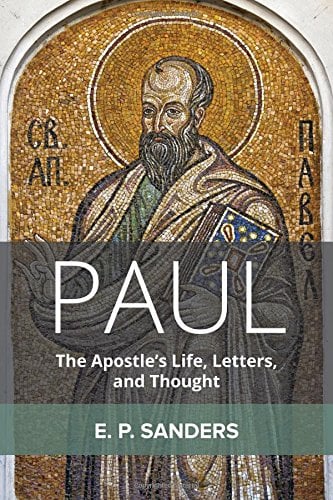This is the beginning of a very long and detailed analysis of one of the most important books to be written on Paul in the last 20 years. It will involve both description and critique. The critique mostly will occur in square brackets [ ], though occasionally it leaks over into the description itself. This discussion will go on for at least a month of blog posts, so I would suggest you strap on your helmets, and prepare for the longer roller coaster ride, reading it to the conclusions. I think the book is very useful as a capstone expression of what E.P. Sanders thinks about Paul, after being one the leading Pauline scholars since the late 70s. His views have not really changed much over the years, but here they are rather fully and clearly expressed and we need to let him have his say, as well as critique him.
—–
E.P.Sanders, Paul: The Apostle’s Life, Letters, and Thought, (Fortress, 2015), 774 pages of text. $39.99 (list price).
Having already done a fine little Intro to Paul for OUP (2001—Paul: A Short Intro), and another one for Sterling (2009, rvsd. version of Paul: A Brief Insight, 1991), here we have something far more substantial.
In the brief Preface Ed tells us that this book had a very long gestation period— from the early 1990s to 2015. During that time he faced some health issues and retirement, and simply being tired, all of which we older scholars understand. He freely admits that he was writing this for undergraduates (all 774 pages of it) and the goal was striving for comprehensiveness— everything Sanders thought he could confidently say about Paul, his life, his letters, his thought. Because of the primary audience all along he was trying to keep the notes to a minimum, and he says he did not want the book to turn into a discussion between one scholar and other scholarly views and positions. He wants to simply make clear his own views from a lifetime of wrestling with Paul. This he does very well. However, the book would certainly have benefited in many ways from a more thorough interaction with Pauline scholarship in the past twenty some years. Some of the older arguments in the book about partition theories about 2 Corinthians, or about the order of the Pauline corpus, or about Acts and Pauline chronology, or about what should be considered a genuinely Pauline letter, or about theories of development, or about which Galatia Paul was talking about simply have too many inadequacies to be still maintained in my view. But I can think of no book which more clearly shows us how presuppositions, historical surmises, and the way one orders Paul’s letters, affects the way one interprets Paul’s thought, and whether and in what ways it developed or didn’t.
The book is written quite clearly, with only a few typos here and there, and it is very readable even though lengthy. The real strength of the book is in the detailed exegetical chapters when he really wrestles with Paul’s thought and persistently tries to trace lines of development and change. None of the more critical parts of the critique that follows should be taken as lack of appreciation for what an accomplishment this book is. It is a fine capstone to an already stellar career of someone who probably knows more about the Jewish matrix out of which Paul came than most of us will ever know and who has changed the course of the discussion of Paul several times over since 1977 when I first encountered Paul and Palestinian Judaism which was already being debated at Durham almost the minute it came off the press and the minute I arrived in England.
In the brief Overview which begins the volume, Sanders maintains familiar positions—Paul was not from a wealthy family, but had learned a trade, tentmaking. He was literate and wrote normal Koine Greek, not particularly elegant unlike Philo. He was immersed in the OT. He probably died in 62 or 64, though he may have been released from his first Roman captivity. His personality was the same before and after his vision of Jesus— always zealous. This should not be attributed to his Pharisaism. He thought Jesus was coming back imminently. The main burden of his mission is that Gentiles could become followers of Jesus without becoming Jews, though they had to accept monotheism and some Jewish morals. ‘We cannot say that his work is the main factor that led to the gentilization of Christianity’ (p. 9).

















